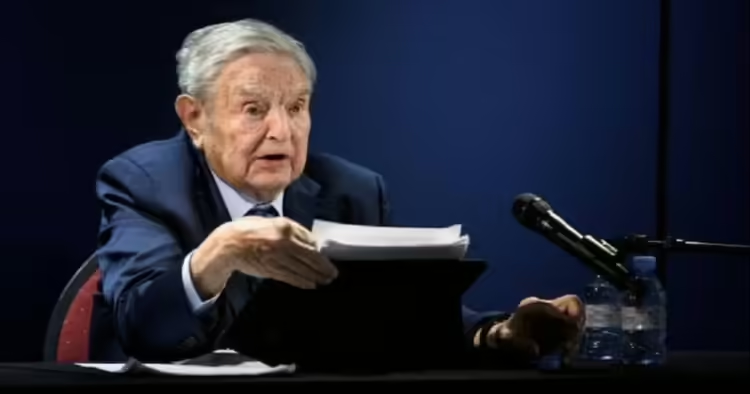The country is in shock after reports emerged suggesting that anti-national propaganda was carried out under the guise of fellowships from the National Foundation for India, allegedly funded by the Ford Foundation of the United States. According to sources, several ‘activist writers’ were awarded fellowships of Rs 30,000 each, with fifteen recipients reportedly hailing from Kerala.
The scheme, dubbed as part of a ‘paid news’ strategy, aimed to destabilise the BJP regime by spreading anti-national news, effectively buying the loyalty of journalists from mainstream and freelance backgrounds. The propaganda efforts were reportedly managed by the National Foundation for India, with alleged financial backing from George Soros’s Open Society Foundation. Key figures in this operation include Dhanya Rajendran and Seema Chisthi, both reportedly serving as media advisors for the foundation. Seema Chisthi, editor of The Wire, is also noted to be the spouse of CPM general secretary Sitaram Yechury.
Reports indicate that the ‘Paid News Scheme’ specifically targeted regions such as Kerala, Kashmir, Uttar Pradesh, Maharashtra, and the North Eastern states. Fellowships were allegedly awarded based on the recommendations of Dhanya Rajendran and Seema Chisthi. The propaganda themes were diverse, including narratives on lynching and beef bans, justification of UAPA accused, incitement of riots in North-Eastern states, environmental issues aimed at sabotaging development projects, criticisms of the Modi regime’s handling of COVID-19, and propagation of caste-related issues.
The fellowship recipients reportedly belonged to minority communities, left-wing extremists, and anti-BJP journalists. A central system was established to provide these journalists with themes for their articles, which were then published in outlets such as The Wire, News Minute, and The Quint. About 150 media persons were said to have received these fellowships. Additional team members were responsible for spreading these articles further.
For instance, Kozhikode native E. Ashfak was reported to have written articles on lynching by cow protection workers, with publications like Caravan and Madhyamam daily featuring such pieces. Members of DIGIPUB were instrumental in propagating these narratives.
Key figures accused of orchestrating this campaign include Dhanya Rajendran and Seema Chisthi, who allegedly managed the media strategy. Reports suggest that the campaign targeted several regions, including Kerala, Kashmir, Uttar Pradesh, Maharashtra, and the North East, with specific themes aimed at undermining the government’s credibility.
Umar Ahmed from Pulwama, Jammu and Kashmir, contributed articles to online portals like Quint and Kashmir Observer, spreading alarm about the environmental impacts of hydel projects. A freelance journalist from Anantnag was allegedly paid to publish claims that the UAPA was being misused in Kashmir. Farhin Qureshi wrote pieces asserting government failure in COVID-19 prevention, while Alishan Jeffry from Lucknow focused on communal riots and beef-related issues in Uttar Pradesh, reportedly under Seema Chisthi’s guidance. Aziz Mirza from Bahraich exaggerated the plight of villagers and Dalits.
Sumit Chakravarthy received a fellowship for reporting on heritage impact news, particularly to sabotage the Metro Railway project in Agra. Additionally, special fellowships were awarded to promote separatism in the North East states.
Reports indicate that fifteen media persons from Kerala received fellowships from the National Foundation for India. Siddiq Kappan worked for Azhimukham portal, the Malayalam section partner of the foundation. Other recipients include Rejimon Kuttappan, Ashfak E.J., Jisha Soorya, Nimisha Pradeep, Amrita Mohan, Arati M.R., Elizabeth Thomas, Ananya S.P., Archa C.A., Arshak M.A., Emintha Paul, Hasna K.H., Jomol Jose, Reshmi Jayadas, and Sidhu Napoleon.
Nationalist and Hindutva forces have long alleged foreign involvement in anti-government protests, pointing to recent violent agitations against laws such as the Farmers’ Produce Trade and Commerce (Promotion and Facilitation) Act, the Farmers’ (Empowerment and Protection) Agreement of Price Assurance and Farm Services Act, and the Essential Commodities (Amendment) Act. The Citizenship (Amendment) Act (CAA) 2019 also faced significant protests, further fueling claims of foreign-funded disruptions.
Congress’s Hollow Promises and Soros’s Alleged Influence Spark Controversy Post-Elections
During the recently concluded parliament election campaign, the Congress party promised Rs 1 lakh per year to women, distributing attractive ‘Guarantee Cards’ across several regions. Following the elections, women lined up at Congress offices in Uttar Pradesh, hoping to claim the promised benefits. Reports indicate that printing these cards incurred significant costs. This unfulfilled promise is believed to have caused an erosion of BJP votes in Uttar Pradesh, Rajasthan, and Bengal, raising concerns about foreign influence in Indian politics.
Allegations have emerged of George Soros’s involvement, suggesting that the Congress’s false promises were part of a broader strategy to destabilise India and hinder its economic growth. Another Congress-led propaganda campaign falsely claimed that constitutional and community reservations would be abolished if the BJP returned to power. As more details unfold, the extent of Soros’s alleged machinations to disrupt India’s ascent as a global economic power is becoming increasingly evident.



















Comments